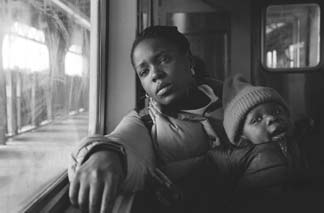Film 'Love and Diane' inspires symposium on clinical family issues
By Dan Aloi

A former Cornell graduate student's documentary film of an impoverished Brooklyn family is the catalyst for a forthcoming symposium addressing myriad societal, legal, cultural and clinical issues that affect millions of Americans daily.
Jennifer Dworkin's "Love and Diane" is a gritty and moving 2002 documentary following five years in the life of Diane Hazzard, a recovering crack addict; her troubled young daughter, Love, an unwed mother; and Love's attempts to reunite with her HIV-positive infant son. The film depicts struggles with unemployment, parenthood, addiction and relapse, welfare, public housing and social services, and trying to survive while learning from past mistakes.
"It stays so resolutely close to this family that it becomes almost unbearable to watch," said Amy Villarejo, director of Cornell's Feminist, Gender and Sexuality Studies Program, the symposium's sponsor. "It's not engaged in anything other than a commitment to this family."
Dworkin pursued a philosophy degree at Cornell from 1992 to 1998, and left to work with the homeless in New York City, where she had first met members of Hazzard's family in 1989.
In 2003 "Love and Diane" won four awards, including Best Film at the Prague One World Film Festival and an Independent Spirit Award. Producer/director Dworkin and Hazzard introduced the Cornell Cinema premiere of the film in October 2003. Dworkin will attend the Cornell symposium.
The 155-minute film will be shown Sept. 8 at 7 p.m. in the Schwartz Center for the Performing Arts' Film Forum. Admission is free.
The symposium will feature three panels Friday, Sept. 9, at the new Africana Studies and Research Center, 310 Triphammer Road. Participants representing a broad range of academic disciplines will be in conversation with professional clinicians, social workers and community service providers, along with individuals, family members and others who deal directly with the issues depicted in the film.
"It touches on so many issues that could stimulate conversations among constituencies that don't normally talk to one another," Villarejo said. "It's an unusual collaboration across the university, [and] a way to bring clinical issues to Cornell."
The morning session, "Psychoanalysis Hits the Streets," will offer the perspectives of professional psychotherapists and psychoanalysts experienced in working with inner-city families. Participants will include Neil Altman, author of "The Analyst in the Inner City" and a clinical professor at New York University, and Ithaca psychotherapists Margaret Dieter and Ashtarra Brissette.
The afternoon panels will be "Families and Children: Changing Theory and Practice," an interdisciplinary discussion of the constraints of social policy and the best options for families and children; and "Politics of Documenting," a round-table discussion of documentary films.
Participants in the families panel are Jane Powers of Cornell's Family Life Development Center; Andrea Mooney, law; Anna Marie Smith, government; Pat Kerr-Segal of Family and Children's Services of Ithaca; and family law attorney Julia Kretzmann.
The film panel will include Villarejo; visiting Africana studies professor Michele Wallace; Ithaca College cinema and photography professor Patty Zimmerman; and German filmmaker Monika Treut, who is visiting Cornell for a Sept. 6-27 retrospective of her documentary work.
The symposium also is supported by Cornell Law School, the Institute for Social Sciences' Evolving Family Project, the Africana Center, Family Life Development Center, Gender and Global Change Program, the Society for the Humanities, the Departments of Government, Human Development, Philosophy and Theatre, Film and Dance, and the Ithaca Therapists Association.
For more information on the symposium, call (607) 255-6480.
Media Contact
Get Cornell news delivered right to your inbox.
Subscribe